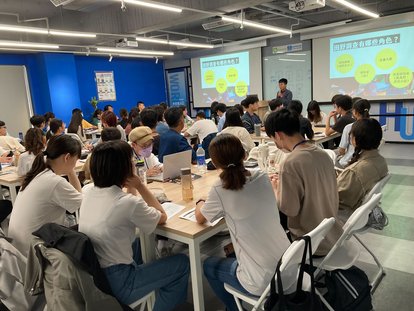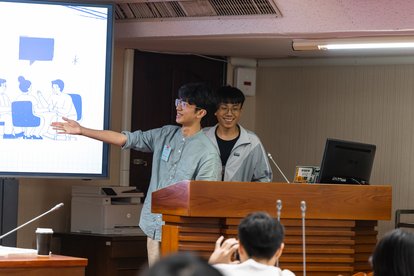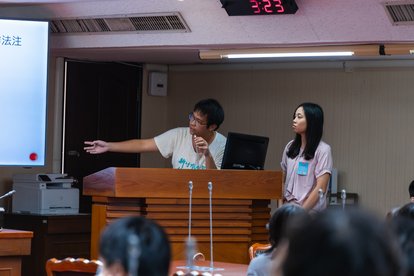Event
Youth Empowerment Project - Our Collaborations with Taiwan Youth Association for Democracy in 2024

© TYAD & FNF 2024 Youth Mock Parliament Interpellation Seminars
In 2024, the Taiwan Youth Association for Democracy (TYAD) and the Global Innovation Hub of the Friedrich Naumann Foundation for Freedom jointly organized the Youth Empowerment Project, which included the 2024 Gap Generation –Young Advocate Empowerment Camp held in Kaohsiung from April 20 to 21 and the 2024 Youth Mock Parliament Interpellation Seminars. The purpose was to cultivate youth awareness of public issues, encouraging them to speak up, engage in dialogue, and take action. TYAD believed that young people were an essential part of civil society, yet the fact was that it was difficult for their voices and the issues they cared about to be expressed or heard due to numerous constraints. Thus, TYAD incorporated in this project various topics, such as Hong Kong issues, transportation, and gender, which young people care, enabling young people to understand these social issues from an intergenerational perspective and ultimately take action.
What Have We Accomplished Together in the Youth Empowerment Project?

© TYAD & FNF Participants were having field studies methodologies class with TYAD’s founder, Mr. Alvin Chang.
For the camp, TYAD designed three main aspects—Issue Introduction Sessions, Field Studies, and Action Plan Presentations. Through providing diverse and practical classes and activities, TYAD hoped that participants could approach issues from different perspectives, facilitating deeper thinking on the issues, and utilizing the investigation methods they learned in the activities to strengthen the discourse basis of their advocacy.
TYAD also invited young professionals and practitioners from different fields to the Issue Introduction Sessions, covering diverse topics like media, human rights, gender, labor, and migrant workers. They shared with the participants their views on the issues, as well as the challenges they actually encountered through their advocacy. Through the “Issue Café” model, these young professionals and practitioners and the participants can come closer to discuss together, and were provided ample time for both to exchange views and visions on the issues, allowing the participants to gain greater experience on advocacy.
Based on its long-term observation and research on Taiwanese youth, TYAD also identified topics more concerned by young people in Taiwan for this camp, and divided the participants into two groups that focused on transportation issues and gender issues respectively. Through onsite visits to local Kaohsiung streets, the participants learned how these issues were presented locally through today’s road planning and the sites relating to gender issues that had been preserved.
Action Plan from Participants
The participants were informed during registration that there would be Action Plan Presentations on the two topics of the Field Studies—Transportation and Gender. The participants were put into two groups to come up with action plans for improvement of current situations. The participants proposed a wide range of viewpoints to improve the current situations:
- Action Plan on Transportation
Regarding transportation issues, during Field Studies session, the speakers led the participants explore the Sanduo Shopping District and streets along Kaohsiung’s MRT Red Line, helping them to evaluate Kaohsiung’s current transportation planning and identify areas for improvement. Some participants proposed in their action plan that the government revise the city’s roundabout planning, as the existing road planning often causes collisions between vehicles moving along the outer lanes of roundabouts and those entering or exiting from the center, resulting in accidents. To address this, they suggested that the government implement new lane markings for roundabouts, while also enhancing driver education; they also highlighted other ideal roundabout redesign projects already underway as references for policy improvements, allowing all participants of the camp, even those who were not in the transportation group, to better understand the current issue and their proposed solutions.
One participant reflected: "…it was a great way to get to know the transportation issues through onsite visits. The poor experience of riding the bus prompted us to consider pedestrian safety issues in greater depth. Although we stayed up until 2 a.m. for the group report, I was incredibly moved after the presentation. I loved this feeling of everyone working together to achieve something/reach a goal. I’m so grateful to my group members, …, I also learned so much about transportation from a member, and he patiently helped clarify my doubts."
- Action Plan on Gender Issues
For gender issues, participants were guided by speakers to visit locations in Kaohsiung connected to gender issues. These included sites such as the Qixian Road’s bar street and the Patriotic Women’s Hall, which served as the office for the first women’s organization in Taiwan in 1923, but was later turned into a comfort station for the Japanese navy. These visits highlighted how gender issues have evolved and been shaped by political changes over time. Some participants reflected: "The walking tour deepened my understanding of gender issues and helped me recognize the importance of history."
For their action plan, the group members focused on the topic of power-based sexual violence, addressing how power imbalances continue to lead to sexual harassment and assault in today’s society. The group emphasized the need to strengthen gender education in schools and called for a comprehensive redesign of educational curricula, while also proposing that gender education can be further promoted to the public through civil actions like creating community platforms and establishing accessible reporting channels.
Youth Mock Parliament Interpellation to Legislators from DPP & KMT

© TYAD & FNF Participants were presenting their slides to demonstrate their grounds for Interpellation to legislators.
In addition to the camp, the TYAD also organized the 2024 Youth Mock Interpellation Seminar, aiming to provide young people with the opportunity to engage face-to-face with legislators, so that they can gain better understanding on the needs of the youth. The seminar was divided into two sessions, one with Legislators from the Democratic Progressive Party (DPP) and another with Legislators from the Kuomintang (KMT). During each session, participants were put into three to four groups to question attending legislators on various topics of their focus, including education, Artificial Intelligence (AI), gender, mental health of young people, protection for the rights of LGBTQ+ students, and student rights. A participant fluently used Hakka language—one of the national languages in Taiwan—to interpellate legislators, which not only amazed everyone and the legislators but also reminded us the importance of offering sufficient support to respect and ensure language diversity in the parliament, such as offering interpreters that can interpreter between Hakka and Mandarin Chinese during interpellation in parliament.

© TYAD & FNF A participant were using Hakka language to interpellate legislators.
The activity simulated a real legislative interpellation process, with each group given 3 minutes to present their questions to legislators, followed by a 5-minute response from the legislators, allowing the participants to understand the actual interpellation process. Participants—mostly students—learned how to prepare and formulate convincing questions and strategies to enable legislators to hear their voice, while the legislators in Taiwan could also directly hear the voices of young people during this Mock Parliament Interpellation.
Participant Feedback
TYAD is happy to receive participants’ feedback for this project that is mostly positive and includes suggestions on how we can make it better next time. We receive feedback from the participants of the Gap Generation Camp:
- "I learned so much during the final presentation—from group discussions to presenting on stage. Not only did I gain a deeper understanding of the issues from the discussions, but I also improved my communication, coordination, and leadership skills as I gradually took the lead in guiding my group discussions."
- "It was a rare opportunity to meet people who are truly engaged in social issues and listen to the challenges they are facing. Thanks to these individuals, societal gaps are being addressed bit by bit. The topic on Taiwan Youth Association for Transitional Justice left a deep impression on me, and after my exams, I’ll definitely sign up for their seminar!"
On the Mock Interpellation Forum, some participants shared the following thoughts and feedback:
- "I really liked how post-it notes were used for discussions, helping us to fully explore the issues through our discussion. If there’s another opportunity, I’d love to participate again and question other legislators."
- "Because of the age gap and the limited time to get to know one another during the activity, some group members were less vocal, which was a bit of a pity. Maybe we could incorporate an icebreaker session like in the empowerment camp to help everyone feel more comfortable."
- "Meeting legislators from different political parties who are genuinely working on practical issues broadened my horizons. Thanks to TYAD for giving me this opportunity, I am truly glad.”
* The article was written by Marco Tsai, Project Planner at the Taiwan Youth Association for Democracy
